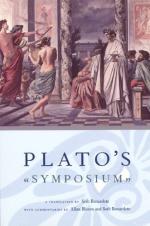
|
| Name: _________________________ | Period: ___________________ |
This test consists of 15 multiple choice questions and 5 short answer questions.
Multiple Choice Questions
1. In what military campaign do Socrates and Alcibiades participate?
(a) Argos.
(b) Pireas.
(c) Volos.
(d) Athens.
2. According to Diotima, who is Love's mother?
(a) Ignorance.
(b) Poverty.
(c) Wealth.
(d) Intelligence.
3. What is the source of the Platonic Dialogues?
(a) The mentoring of other philosophers by Socrates.
(b) The conversations between Socrates and friends.
(c) The mentoring of young minds by Socrates.
(d) The conversations between Socrates and strangers.
4. Who objects to the drinking taking place in Chapter 8?
(a) Aristophanes.
(b) Eryximachus.
(c) Socrates.
(d) Agathon.
5. Which one of the following is not used by Diotima to describe Love?
(a) Wise.
(b) Tough.
(c) Poor.
(d) Scheming.
6. In Agathon's opinion, what does love compel people to do?
(a) The wrong thing.
(b) The right thing.
(c) Mostly the right thing, but sometimes the wrong thing.
(d) Mostly the wrong thing, but sometimes the right thing.
7. According to Socrates, what is the lover directed towards?
(a) What he or she does not have.
(b) What he or she will never understand.
(c) What he or she already has.
(d) What he or she does not understand.
8. What does Socrates ironically state his speech is about?
(a) Neither the truth nor fiction.
(b) The truth.
(c) Fiction.
(d) Both the truth and fiction.
9. Which one of the following is not included in the things Agathon thinks are associated with love?
(a) Springtime.
(b) Bloom of youth.
(c) Summer rainfall.
(d) Blossoming of flowers.
10. Where is Diotima, Socrates' teacher, from?
(a) Tripoli.
(b) Mantineia.
(c) Levidi.
(d) Dimitsana.
11. In Diotima's opinion, who is Love's father?
(a) Skill.
(b) Will.
(c) Resource.
(d) Power.
12. As explained by Alcibiades, how does Socrates make him feel?
(a) Bold.
(b) Afraid.
(c) Intelligent.
(d) Ashamed.
13. In Agathon's opinion, how does love win?
(a) By force, never by persuasion.
(b) Mainly by force, and sometimes by persuasion.
(c) By persuasion, never by force.
(d) Mainly by persuasion, and sometimes by force.
14. As explained to Socrates by Diotima, what event brings Love's mother and father together?
(a) Aphrodite's birth.
(b) Alcmene's birth.
(c) Athena's birth.
(d) Artemis' birth.
15. According to Diotima, how many people does a young person eventually become attracted to?
(a) One.
(b) Many.
(c) Two.
(d) None.
Short Answer Questions
1. Which one of the following is not listed by Socrates as an idea that can be transmitted through love?
2. What does Diotima tell Socrates about Love's function?
3. How does Socrates view people in Alcibiades' view?
4. Who does Alcibiades compare Socrates to in his speech?
5. In Diotima's opinion, what does a potential philosopher learn about beautiful minds?
|
This section contains 478 words (approx. 2 pages at 300 words per page) |

|




